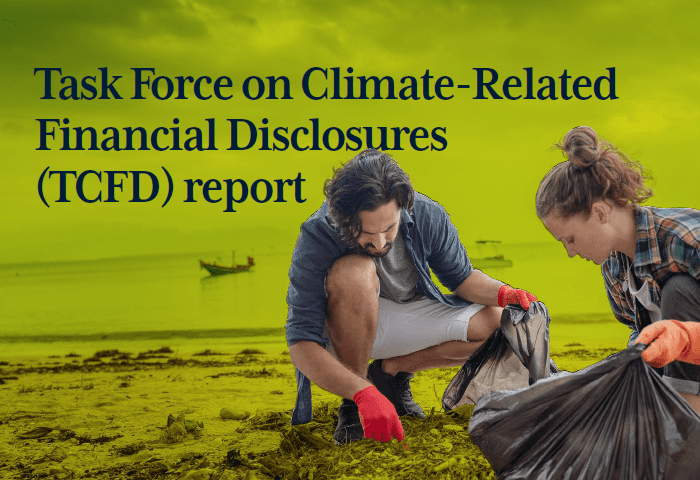NOW: Pensions has today published its first Task Force on Climate-Related Financial Disclosures (TCFD) report covering the period 1 October 2021 to 31 March 2022.
The workplace pensions provider has committed its investments to net zero greenhouse gas emissions by 2050, with an interim target of 50% emissions reduction by 2030 based on 2019 levels.
NOW: Pensions has invested in green, social, and sustainable bonds for five years. It has also significantly increased its holdings of lower-carbon investments, for example, equity investments in lower-carbon companies.
Climate change is one of a number of sustainability issues important to NOW: Pensions’ investment strategy. The three priority sustainability issues are climate action, gender equality and living wages.
The TCFD report discloses three key metrics:
- Metric 1 is the total greenhouse gas emissions of our corporate equity exposures: This is 164,700 tons of greenhouse gas (also known as carbon dioxide equivalent).
- Metric 2 is the carbon footprint of our corporate equity exposures: This is 71.3 tons of greenhouse gas per million pounds invested.
- Metric 3 is the investments we have made with an explicit sustainability objective and includes green and sustainable bonds, lower-carbon ESG-screened equities and environmentally aware cash investments: This is 56% of our investments.
NOW: Pensions has taken steps to ensure its investments are resilient to climate change-related risks and opportunities, considering risk, return and real-world impact across its investment strategy.
The provider has invested in green, social, and sustainable bonds since 2017. The sustainable bonds, which total 13% of the portfolio as of 31 March 2022, finance a range of environmental projects, from solar and wind energy production to low-carbon transport and residential buildings.
NOW: Pensions has significantly increased its investment in sustainable equity. This doesn’t mean it has disinvested from energy companies, companies with higher carbon footprints, or companies exposed to social issues. NOW: Pensions invests on the basis that it expects their business models to change to be more sustainable.
As investors, NOW: Pensions and its investment manager Cardano, engage with these companies with the aim of supporting them – and if necessary, requiring them – to transition to a lower-carbon business model. This is called stewardship and is an important part of the NOW: Pensions strategy.
The business has committed to run a series of focus group sessions with members to seek feedback on sustainability topics, including climate change.
Joanne Segars, Chair of Trustees at NOW: Pensions, comments: “Climate change remains squarely at the top of our agenda. The climate crisis has profound implications for our savers. Left unchecked, runaway climate change will lead to substantial financial, environmental, and social consequences. This is clearly not in our savers’ best interests – which is why climate change is squarely at the top of our agenda.”
“To help us manage climate change-related risks and opportunities, we have committed our investments to net-zero greenhouse gas (‘GHG’) emissions by 2050 at the latest. This means that the investments we make will not add to the amount of GHG in the atmosphere. We have also set an interim target, committing our investments to 50% emissions reduction by 2030 at the latest, based on 2019 levels.”
Emma Matthews, Head of Investments at NOW: Pensions commented: “We’ve invested in green, social, and sustainable bonds since 2017. Our sustainable bonds finance a range of environmental projects, from solar and wind energy production to low-carbon transport and residential buildings.”
“We’ve significantly increased our investment in sustainable equity. This doesn’t mean we disinvest from energy companies, companies with higher carbon footprints, or companies exposed to social issues. We invest on the basis that we expect their business models to change to be more sustainable.”
Will Martindale, Head of Sustainability at NOW: Pensions commented: “In our TCFD report, we include three scenarios and report emissions metrics for Scopes 1, 2 and 3 emissions to give a full assessment of the climate change-related risks and opportunities across our portfolio.”
“As well as managing risks, we believe we have a responsibility to take action to address climate change. We engage with companies in our portfolios with the aim of supporting them – and if necessary, requiring them – to transition to a lower-carbon business model. This is called stewardship and is an important part of our strategy.”
Read the report: Task Force on Climate-Related Financial Disclosures (TCFD) report
ENDS
Notes to Editors
For more information, please contact:
Samantha Gould
NOW: Pensions
07827 3555 18
Samantha.gould@nowpensions.com
Instinctif
Libby Wallis/Will Todd
07581 205 660 / 020 7457 2020
Nowpensions@instinctif.com
About NOW: Pensions
NOW: Pensions is an award-winning UK workplace pension provider. We look after the pension savings of tens of thousands of employers and millions of members from a wide range of industry sectors.
We have a clear mission – to help everyone save for a more financially secure future. This means achieving the best financial outcomes for our own members, while fighting for a fair pension system to enable all pension savers to enjoy the retirement they deserve. We do this by highlighting pension inequalities and campaigning for change.
We are the UK’s third largest auto enrolment pension provider by number of members.
NOW: Pensions is part of the Cardano Group, a market leader in providing risk and investment management services designed to make pensions outcomes more stable and robust.
What is the TCFD?
The Taskforce for Climate-related financial disclosures (TCFD) was established in 2015 by the Financial Stability Board (FSB). It is an industry led reporting framework setting out recommendations for companies and investors to organise and standardise their climate disclosures.
It was set up because the TCFD considered:
- The financial risks and opportunities posed by climate change are not fully understood or priced by financial markets
- Corporate and financial institutions are not prepared for the transition to a low-carbon economy
- Which will lead to misallocation of assets, the risk of asset stranding, and market volatility – in other words, costs to long-term savers

